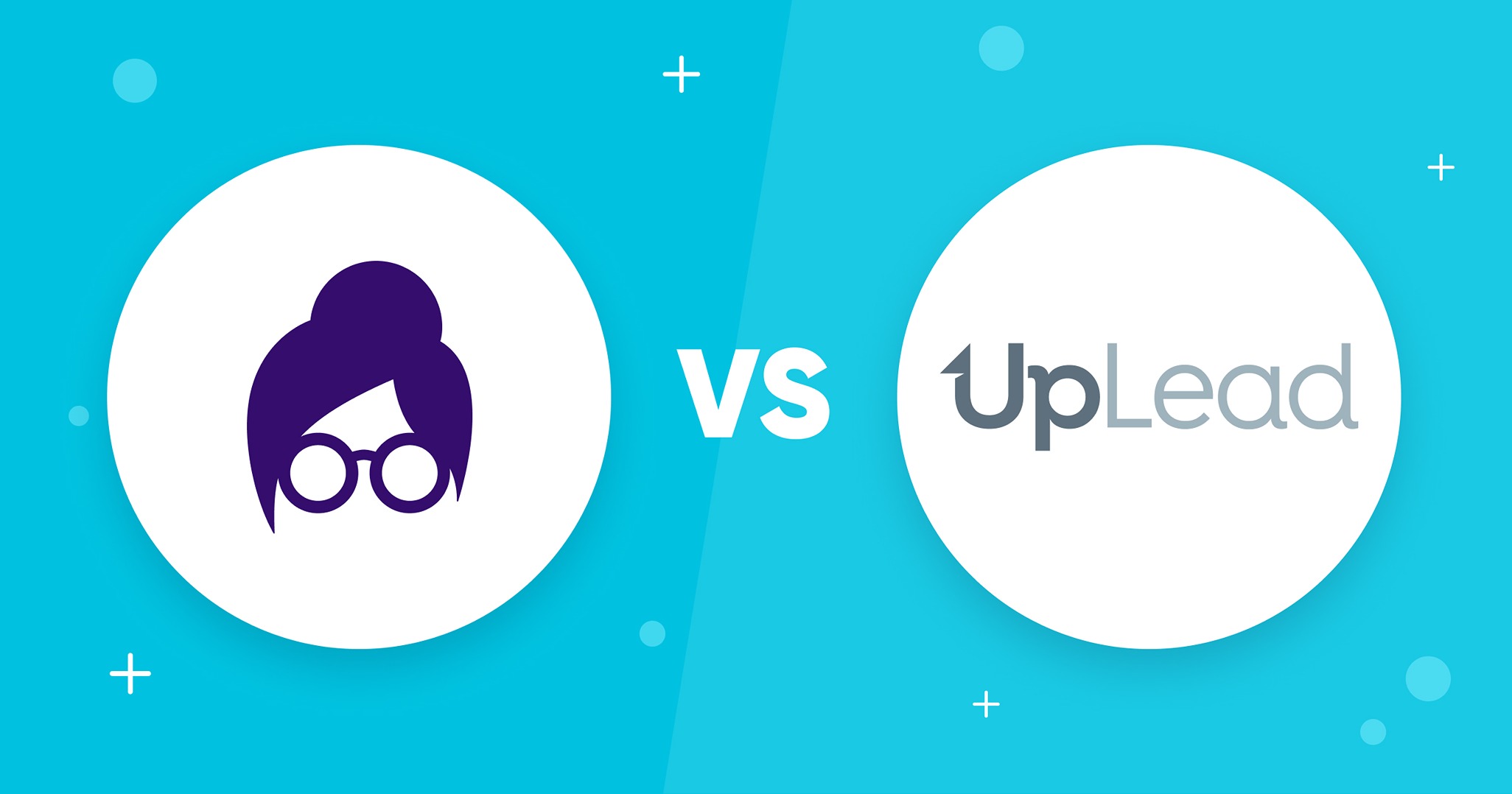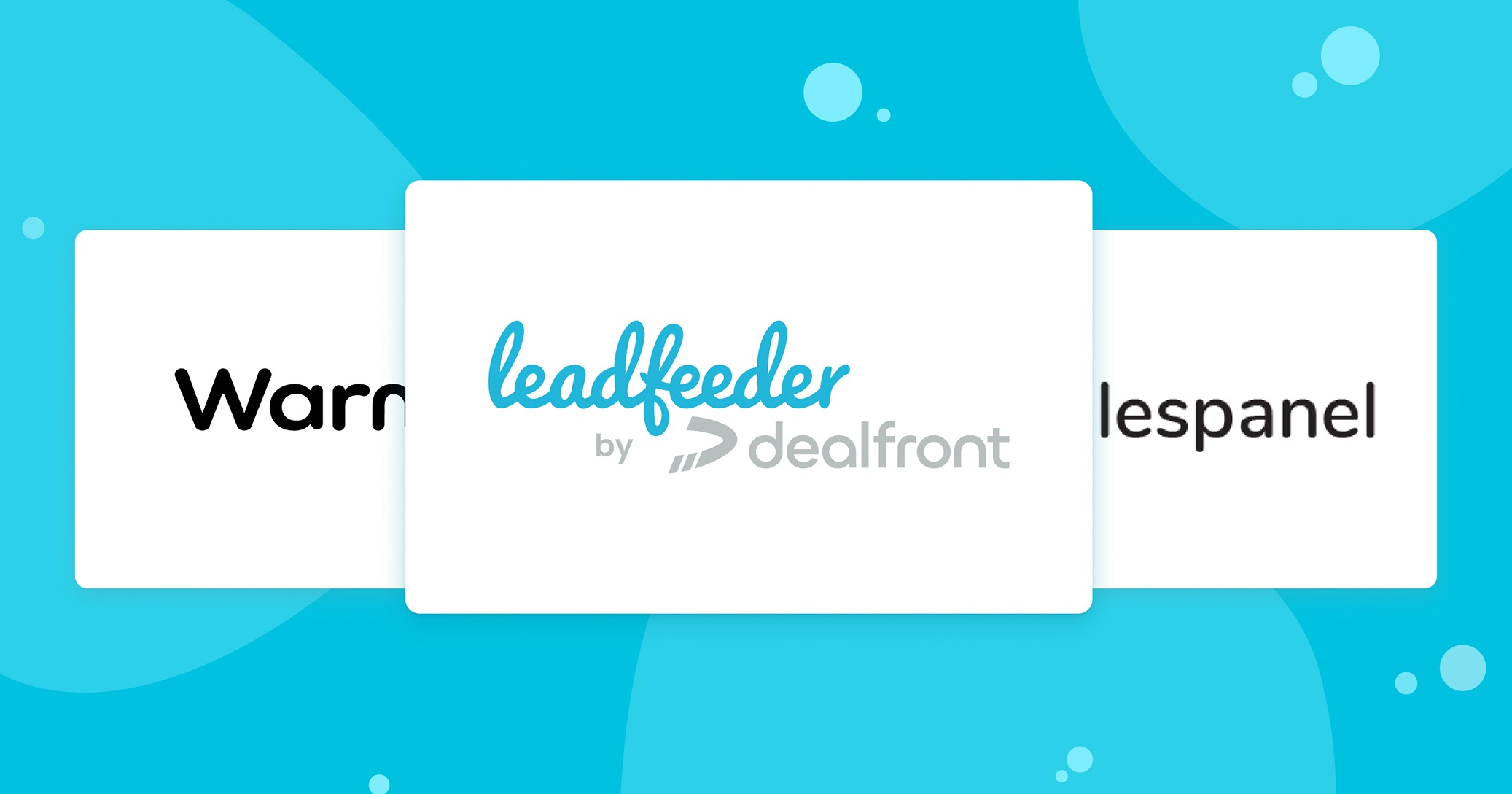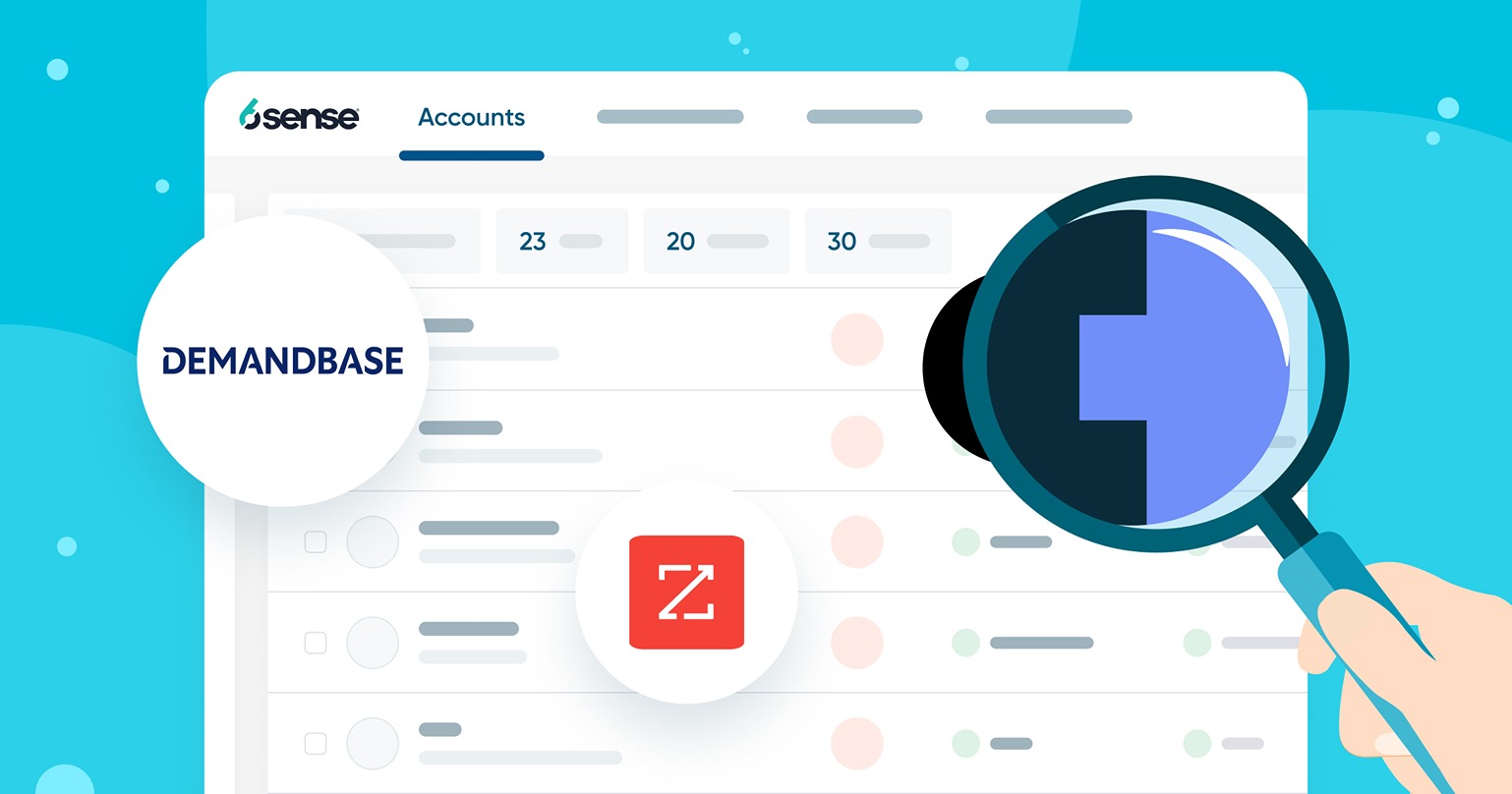The right B2B lead generation platform can help your sales team focus on potential customers who already have an interest in your company. These tools allow you to prospect target accounts and potential clients, and many of them offer built-in outreach tools.
Both Leadfeeder and Lead Forensics are popular lead generation tools available today, and in this guide, we’ll show head-to-head comparisons across key categories to help you decide which one may be right for you and your business.
What is Leadfeeder?
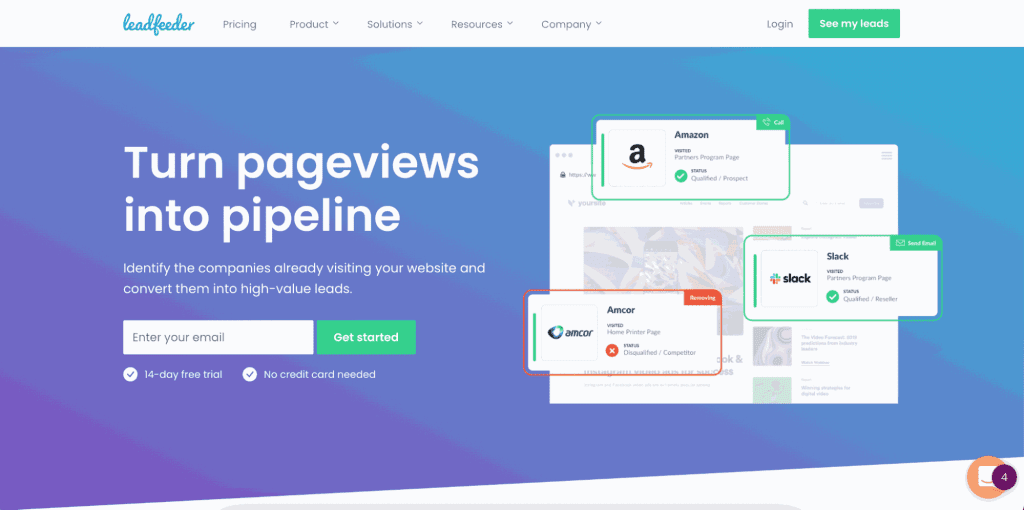
Leadfeeder is a lead generation tool that not only identifies visitors to your website but also converts them into high-value leads by integrating with the CRM and marketing automation tools you already use.
For example, Leadfeeder integrates with popular tools like Slack, Salesforce, Hubspot, Google Ads, and Microsoft Dynamics. That way, your web traffic that was once anonymous is turned into real names and contacts, allowing you to contact them faster.
Leadfeeder also enables users to filter quality leads and remove unwanted companies so they can prioritize sales efforts, build better sales funnels, implement lead scoring, and develop automated lead-nurturing sales campaigns. All of this is available in a user-friendly platform for technical and non-technical users.
What is Lead Forensics?
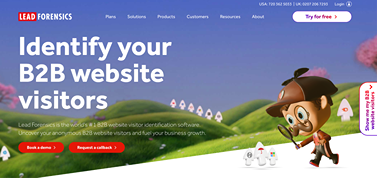
Lead Forensics is another lead generation tool that helps businesses identify and track their B2B website visitors. This platform uses visitor identification software to identify anonymous website visitors so that businesses can generate new, high-value sales leads, drive customer satisfaction and revenue, and create a stronger demand for their services.
This tool provides important and accurate information about web visitors, such as their contact information, the specific pages they view, and how they found the site in the first place. It also allows users to segment their visitors based on their interests and behaviors for more targeted marketing and sales efforts.
Main Differences Between Leadfeeder and Lead Forensics
There are many similarities between Leadfeeder and Lead Forensics, such as tracking website visitors, identifying their personal information, lead scoring, integrations, and reporting. However, some main differences between Leadfeeder and Lead Forensics may help you decide which platform works best with your existing tools, team, and marketing strategies:
- Visitor tracking: Lead Forensics has more in-depth visitor tracking and real-time visitor data. Although Leadfeeder also tracks the visitors to your site and has real-time alerts, Lead Forensics gives immediate access to allow quick follow-up and engagement.
- Integrations: Leadfeeder integrates with many popular CRM and marketing automation tools as compared to Lead Forensics. It also integrates directly with Google Analytics so that businesses can use existing traffic data. Lead Forensics also offers integration options, but they are nowhere near the amount as compared to Leadfeeder.
- Mobile app availability: Only Leadfeeder offers a mobile app for iOS and Android devices.
- Reporting and analytics: Both Leadfeeder and Lead Forensics provide detailed reports and analytics. Leadfeeder includes behavior and engagement in their reports, while Lead Forensics offers more robust reporting, including behavior and engagement, lead conversion rates, campaign effectiveness, and other enhanced reporting options.
- Transparent pricing: Only Leadfeeder offers a free option and then transparent pricing plans. Lead Forensics does have a short free trial, but then only offers customizable pricing plans that may be more expensive and prohibitive for smaller companies.
Comparison Table: Leadfeader vs. Lead Forensics
How does Leadfeeder compare to Lead Forensics? Here’s a quick table to see how they stack up.
| Leadfeeder | Lead Forensics | |
| Use Cases | Identifies website visitorsTracks on-site behaviorAdvanced filtering systemsForm, video, and download tracking | Identifies website visitorsReal-time alertsAutomated CRM workflows |
| Database Size & Reliability | More than 200 million data points | More than 1.4 billion B2B IP addresses |
| Data Enrichment Features | Website visitor trackingReal-time tracking of visitors detailed company profilesComprehensive reporting features | It may be more difficult and complex to navigate |
| Lead Management | Ranks and prioritizes leads based on visitor behavior | Ranks and prioritizes leads based on engagement and data analysis |
| AI Features | Language-specific AI models for data extraction and classification, Google Analytics, customer segmentation, advanced algorithms and tracking scripts | Identification of high-quality leads, customer behavior, intent, other data |
| Integrations | Pipedrive, Salesforce, Hubspot, Zoho, Microsoft Dynamics 365, Slack, Google Chat, Google Ads, Looker Studio, Mailchimp, ActiveCampaign, Zapier | Salesforce, Hubspot, Microsoft Dynamics, Zoho, Pipedrive |
| Ease of Use | User-friendly interface designed for ease of use | May be more difficult and complex to navigate |
| Compliance | Fully compliant with GDPR/CCA requirements | ISO and ICO certificates, product data compliance, GDPR and CCPA complaint |
| Browser Extension | No | No |
| Free Access? | Yes | Limited |
Leadfeeder vs. Lead Forensics Key Features
From CRM integration to customizable dashboards, there are key features to both Leadfeeder and Lead Forensics that set them apart from their competitors and each other.
Leadfeeder Key Features
We chose the most popular key features of Leadfeeder below:
- CRM integration: As noted above, Leadfeeder integrates with many popular CRM and marketing automation tools. This alone sets it apart from other platforms, yet another benefit is its seamless integration with Google Analytics. This allows companies to leverage their existing traffic data so that they can track visitor behavior easily together with other types of metrics.
- Lead identification: This is the main reason you would use Leadfeeder, as it identifies companies that visit your website even if they do not give any personal information on a form or contact area.
- Lead scoring: A score is given to each identified company based on their website behavior and engagement, so businesses can prioritize their leads based on their engagement with the website. That way, sales teams can focus on the higher scoring leads with the most potential of further action.
- User-friendly interface: The Leadfeeder platform is very easy to use for both technical and non-technical users. This means your staff will need minimal training to navigate the system.
- Customizable reporting and analytics: Users receive customizable and detailed reports and analytics on website visitors’ behavior and engagement. Users can also create custom data views for more data-driven decision-making.
- Real-time visitor alerts: Timely notifications are given for noteworthy visitor actions so that users can engage with leads in real time.
Lead Forensics Key Features
Lead Forensics also has key features to consider:
- In-depth visitor tracking: Similar to Leadfeeder, Lead Forensics also tracks visitors to your website. However, this company outshines other platforms with its detailed insights into visitor behavior and engagement, such as what pages are viewed and how long they stay on the site. They also provide the contact information and other important details about their visit. Overall, Lead Forensics provides rich data on the companies that visit your site.
- Real-time visitor data: Another aspect that sets Lead Forensics apart is its immediate access to information about who is visiting your site. That way, users can follow-up and engage with these leads right away to increase the chances of converting leads into sales.
- Strong reporting features: Lead Forensics has advanced reporting options that allow users to not only see who visits their site, but also analyze their behavior in greater depth.
- Lead segmentation: Users can also segment the visitors based on their interests and behavior. That way, you can personalize your communication outreach.
- Customizable dashboard: Although Leadfeeder’s platform is easier to use, Lead Forensics does allow you to customize your dashboard so you can track and analyze your website visitor data in real-time.
Leadfeeder vs. Lead Forensics Data
Lead Forensics claims to be the largest global database, and the numbers seem to back up the claim. It has also led the way with accuracy and data reliability, illustrated in the comparison below.
Leadfeeder Database
Leadfeeder has over 200 million data points to gather information about individuals and companies visiting a user’s site. They start with Google Analytics as the main data source and then use supplemental databases to provide information on who is visiting your site. The coverage provided includes the time and date of the visit, the source and medium, how many pages were visited, the visitor ID number, and even the total length of the visit.
Data accuracy was a common complaint of Leadfeeder. Leadfeeder is connected to DealFront, and although they do use advanced algorithms to deliver website visitor insights, the lack of preciseness may impact the lead generation capabilities.
Lead Forensics Database
Lead Forensics has a database of more than 1.4 billion B2B IP addresses, and more are being added every day. In addition to these lead sources, their accuracy rates are impressive as compared to Leadfeeder. Contact information includes the business name, contact details of key decision makers, telephone, email, and LinkedIn details, and financial data.
Not only that, but Lead Forensics also finds a company’s key stakeholders and their contact information so that you can focus on those decision-makers immediately.
Leadfeeder vs. Lead Forensics Cost
Both Leadfeeder and Lead Forensics have two different pricing plans from which to choose. However, Leadfeeder’s one option is free, and the company is more upfront and transparent with their paid option.
Leadfeeder Plans & Pricing
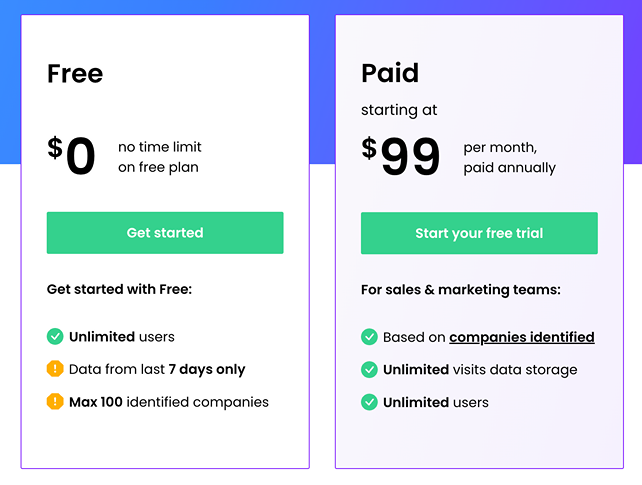
A primary benefit of Leadfeeder is its free plan option – yes, it is free forever and allows unlimited users. However, this plan is also minimal and only includes up to 100 identified companies and visitor data storage over the last seven days.
Leadfeeder does give a 14-day free trial of the paid option (and then you would be downgraded to the free plan). The paid option also allows unlimited users, but with this plan, you get all identified companies and unlimited data storage. Other benefits of the paid plan include:
- Verified company details
- Reveal contact details
- Visitor behavior and activity
- Two-way CRM integrations
- Marketing integrations
- Custom feeds and filters
- Automatic notifications
- Monitoring of target accounts
- Website form tracking
- Video and download tracking
- User management
The paid plan is charged using a price tier that starts at $99 a month if paid annually or $165 per month (paid monthly) and then increases depending on the number of companies identified.
For example, if you paid annually and had up to 50 companies identified, it would be $99 a month. 51-100 companies identified increase to $119 a month, 101-200 increase to $143 a month, and so on. These prices rise significantly if you pay monthly rather than annually.
Lead Forensics Plans & Pricing
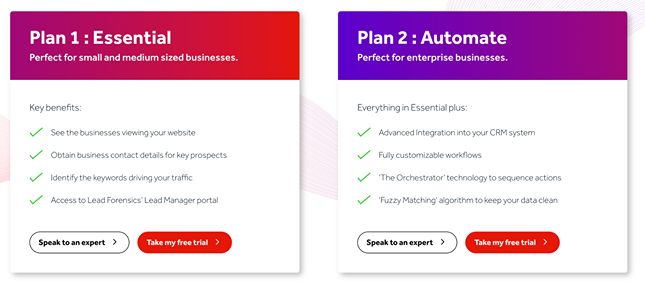
Lead Forensics also offers two plans: Essential and Automate. The actual prices for the plans are not as transparent as Leadfeeder’s—the cost of Lead Forensics also goes by a price tier based on how much traffic you generate to your website. However, they do not list the actual prices like Leadfeeder because they are “customizable.” Lead Forensics does offer free trials of both plans.
The Essential plan is a great place to start for small to midsize companies since it has nearly all of the features of the more expensive Automate plan. Features of both plans include:
- Unlimited users
- List of business visitors
- Contact data
- Categorization
- Real-time notifications
- Trigger reports
- Conversion tracking
- Customizable dashboard
- Data export
- Named customer success manager
- Import and manage data files
- Lead manager
- Lead scoring
- Integration with CRM
If you choose the more expensive Automate plan, you will also receive automated CRM reports, prospect pipeline reports, and key account behavior tracking.
Leadfeeder vs. Lead Forensics Integrations
Leadfeeder offers more integration options than Lead Forensics, which allows your company to manage leads seamlessly, streamline workflows, improve efficiency, and collaborate more closely with your sales and marketing teams.
Leadfeeder Integrations
Leadfeeder integrates with the following popular CRM systems:
• Pipedrive
• Salesforce
• Hubspot
• Zoho
• Microsoft Dynamics 365
• Slack
• Google Chat
• Google Ads
• Looker Studio
• Mailchimp
• ActiveCampaign
• Zapier.
Leadfeeder also integrates with Google Analytics, making it suitable for companies that prioritize integration because they can leverage their existing traffic data without using additional setups. This benefit makes it much easier to track visitor behavior together with other marketing metrics you are using to track website visitors. However, two-way CRM integrations are only available with the paid plan, not the free option.
Lead Forensics Integrations
Lead Forensics also integrates with popular CRM systems, but not at the same level as Leadfeeder. Lead Forensics only integrates with Salesforce, Hubspot, Microsoft Dynamics, Zoho, and Pipedrive. If these integration options are sufficient, Lead Forensics also gives companies seamless lead management and enhanced collaboration between your sales and marketing teams.
Lead Forensics also lacks an API, so it is not easily integrated with other applications. Although it does provide its own CRM, other CRMs are only available with its higher-tiered plan.
Leadfeeder vs. Lead Forensics Customer Reviews
What are actual users saying about Leadfeeder and Lead Forensics? We read through the positive and negative reviews for both companies to find out.
Leadfeeder Reviews
Leadfeeder’s reviews on G2 are solid, with nearly 700 four- and five-star reviews for their ease of set up, integration capabilities, transparent pricing, and lead insights. Many reviewers praised Leadfeeder’s robust features that have helped them enhance their sales and marketing strategies. One user said that “the return on investment justifies the cost,” further demonstrating that many users find the pricing structure reasonable based on what you get in return.
Another benefit that sets Leadfeeder apart from Lead Forensics is how it seamlessly integrates with CRMs. One reviewer described how beneficial Leadfeeder was for not only identifying anonymous website visitors but also combining this personal data by “seamlessly integrating with various CRM and email marketing tools.”
Although Leadfeeder’s ease of use and CRM integration are overwhelming positives, some reviewers complained about the accuracy of the information, particularly with the anonymous visitors. Users found instances where the information was not as accurate and precise as they had expected, which could impact lead generation and follow-up approaches.
Lead Forensics Reviews
Lead Forensics also had more than 700 four- and five-star reviews, although they also had more one-star ratings than Leadfeeder on G2. The positive reviews is where accuracy reigned supreme, with reviewers praising the intelligence details about website visitors, including the companies, like size, location, and industry. The filter capabilities are also a benefit, allowing users to create reports based on their target prospect profiles. The triggered reports were also found to be beneficial to the effectiveness of ad campaigns and marketing efforts.
Not only is the lack of CRM options an issue, but some reviewers complained about how difficult it is to even connect to CRM platforms. For example, one reviewer said it was tricky to connect Lead Forensics to Salesforce and it took a while to get this integration to work correctly. Also, the ease of use was lacking in many reviews.
A Final Look at Leadfeeder vs. Lead Forensics
Let’s take a final look at how these platforms compare.
Leadfeeder Pros & Cons
Leadfeeder offers an impressive list of CRM integrations, an easy-to-use interface, and seamless integration with Google Analytics. However, it also received complaints about its data accuracy and a limited free version.
Pros:
- Impressive list of CRM integrations with various systems
- Seamless integration with Google Analytics
- Lead scoring features to prioritize leads
- User-friendly interface for both technical and non-technical users
- Customizable reports and dashboards
- Alerts and notifications of changes or actions for proactive lead engagement
- Transparent pricing plans
Cons:
- Concerns about the accuracy of data
- Very limited free version
Lead Forensics Pros & Cons
Accuracy is definitely a benefit with Lead Forensics, real-time visitor tracking, robust and comprehensive reporting features, and company profiles. But, with its pricing plans being much less transparent and difficult to use interface, the cons may prohibit this platform from being used by smaller companies.
Pros:
- Real-time visitor tracking of website visitors for quick engagement
- In-depth and accurate visitor tracking and information
- Comprehensive company profiles, including industry information, contact details, and employee counts
- Robust reporting features and advanced reporting options
- Lead scoring and prioritization features
Cons:
- Complex, difficult to use interface that can overwhelm non-technical users
- Non-transparent pricing that is rumored to be much higher than competitors
- Some customer support concerns (related to the difficult interface)
Summing Up: Leadfeeder or Lead Forensics?
If you are new to lead generation or on a budget, Leadfeeder’s free forever option is a good choice to try out its basic functions. However, you do get what you pay for, and you will find that the CRM and marketing integrations, custom feeds and filters, and other benefits are only available with the paid version.
Choose Leadfeeder For Affordability
Companies that are on a budget and place an emphasis on user-friendly platforms that integrate with a variety of CRM tools and Google Analytics. Although the accuracy of data has been an issue and the data size does not compare to Lead Forensics, Leadfeeder’s integration benefits allow users to seamlessly manage their leads and optimize their marking and sales forces.
Choose Lead Forensics For Robust Data Sets
Larger organizations that want to benefit from the more than one billion data points offered and advanced lead tracking and reporting offerings. Custom pricing is available based on a company’s web traffic levels and needs, and the accuracy standards are impressive for larger corporations.
UpLead is the Most Reliable Tool for Lead Generation
Many reviewers complained about the accuracy of data from Leadfeeder and the expense and useability issues with Lead Forensics. Luckily, UpLead exceeds Leadfeeder in accuracy and is more transparent with its pricing options than Lead Forensics.
UpLead is well known for its 95% accuracy rate for emails and achieves this near-perfect rate through a combination of human and machine-learning email verification processes. These results ensure your outreach efforts are more effective. After the seven-day free trial, UpLead has very competitive pricing structures: $99 a month for its Essentials plan and $199 a month for the Plus plan.
UpLead also offers a user-friendly platform, real-time email verification for higher-quality leads, and access to over 160 million contacts worldwide. Try UpLead today for free and experience the power of high-quality leads and an easy-to-use platform.

